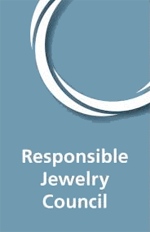“[The] Responsible Jewellery Council’s Chain of Custody destroys value […]
The Chain of Custody is a fiction that cannot truly be verified.”
– Chaim Even-Zohar, one of the most prominent, respected journalists in the jewelry trade press.
The Responsible Jewellery Council (RJC) website declares that its 350+ members are
“committed to promoting responsible ethical, human rights, social and environmental practices in a transparent and accountable manner throughout the industry from mine to retail. “

As Director of Fair Jewelry Action USA, I too am dedicated to the development of a robust jewelry supply chain that supports human rights and environmental responsibility. So I am quite familiar with the RJC and how it works. It represents the most prominent attempt to address ethical shortcomings in the supply chain of the jewelry trade in North America and around the world. Because of their prominence, any action taken by the RJC impacts the reputation of the entire jewelry sector.
RJC’s size and prominence could be a huge advantage to social/environmentally conscious jewelers worldwide, and to the communities and the environments from which our metals are sourced. Unfortunately, as Mr. Even-Zohar declares, the opposite is true.
RJC’s Chain of Custody “destroys value” because its claims don’t match reality. Even-Zohar’s article details how a chain of custody in diamonds would not work given the underlying structure of the diamond industry and its supply chain.
My concerns are from a different perspective, but they are just as essential for RJC’s credibility:
- RJC’s initiatives were developed without civil society input.
- RJC's initiatives were developed without meaningful environmental community input.
- RJC's initiatives require no independent oversight.
- RJC’s membership – which includes no civil society/environmental representation – DOES include the multinational mining industry.
In short, the RJC is the jewelry and mining industries policing themselves to meet standards they developed themselves.
The ethical imperative in today’s world requires an RJC different than the current one. It requires an RJC that:
- has a transparent multi-sector decision making process,
- includes an equal seat at the table for civil society groups such labor, NGOs, and impacted communities,
- has checks and balances to provide a counterweight to interests of the large companies in its membership,
- focuses on ethical sourcing where members uphold their stated standards, and
- does not provide cover to the most irresponsible companies in the world.
Rephrased, the RJC needs to make bedrock principles of inclusivity, traceability, and transparency.
Chaim Even-Zohar’s critique suggests it may not be possible to have a real chain of custody in the mainstream diamond industry. It also demonstrates the RJC is losing support not just from path-breaking, fair trade, grassroots jewelers. It is losing support from larger, mainstream interests as well.
To their credit, RJC will review their diamond supply chain proposal. But if the RJC is under review, let’s make it thorough. For RJC to find the credibility that it wants, RJC NEEDS support and engagement from civil society organizations.
Currently there is zero civil society representation on the RJC board or at any stage in the RJC process. Without it, the RJC will continue to cede leadership in ethical sourcing to other organizations that represent the authentic movement in ethical sourcing, such as the Initiative for Responsible Mining Assurance, Alliance for Responsible Mining, Ethical Metalsmiths, Fair Labeling Organization, and my organization of over forty members, Fair Jewelry Action.
The response in the UK market for Fairtrade and Fairmined gold; and the strong niche market in ethical sourcing in the US supports the notion that the public wants jewelry that benefits everyone. The RJC isn’t necessary to make that happen.
But many jewelers, including myself, want the RJC to work—just like we wanted the Kimberley Process to keep conflict diamonds out of the marketplace to work. Yet like the failed Kimberley Process, I am concerned that and the RJC may have structural flaws that prevent its credibility outside of its own houses of mirrors.
Marc Choyt is founding Director of Fair Jewelry Action, USA. He is president of Reflective Images, which produces artisan fair trade gold wedding rings and engagement rings at Artisan Wedding Rings.
